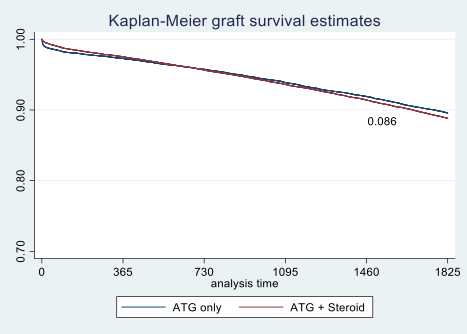A Question with Multiple Answers: Do Renal Transplant Recipients Require Steroid Maintenance Following Thymoglobulin Induction?
Beth Israel Deaconess Medical Center, Boston, MA
Meeting: 2021 American Transplant Congress
Abstract number: 919
Keywords: Antilymphocyte antibodies, Immunosuppression, Outcome
Topic: Clinical Science » Kidney » Kidney Immunosuppression: Induction Therapy
Session Information
Session Name: Kidney Immunosuppression: Induction Therapy
Session Type: Poster Abstract
Session Date & Time: None. Available on demand.
Location: Virtual
*Purpose: Anti-thymocyte globulin (ATG) has been used with good results in renal transplantation as induction therapy, followed by triple immunosuppression with calcineurin inhibitors, antimetabolites, and steroids. In 2004, steroids avoidance regimens started to be used by transplant centers, and since the year 2007, about 30% of kidney transplant patients in the USA have been discharged without steroid maintenance therapy. In this study, we evaluated outcomes of kidney transplant recipients who received ATG and were maintained on steroids and compared them to patients who did not receive steroid maintenance therapy after transplant using UNOS/OPTN database.
*Methods: We conducted a retrospective cohort analysis of the UNOS database. We identified all kidney transplant patients who received ATG as induction therapy between January 2007 & December 2018. We divided the cohort based on whether they received steroids as part of maintenance immunosuppression or not, and compared transplant and patient outcomes. Baseline donor and recipient characteristics were compared between groups using Student t-test or Kruskal Wallis test for continuous variables and Chi-2 test for categorical variables. Kaplan Meier curve was used to measure graft survival time.
*Results: A total of 89,044 patients were identified who received their first renal transplant between the year 2007 and 2018. Of them, 29,825 [33.5%] recipients received ATG and did not receive steroid maintenance therapy on discharge. Patients without steroid maintenance had significantly higher acute rejection rate compared to patients who received steroid maintenance therapy, (7.3% vs 6.4% p < .001). Similarly, graft failure rate at 1st year was significantly higher among the recipients who received steroid free maintenance immunosuppressive therapy (2.5% vs 2.2%, p=0.009). There was no significant difference in graft survival time, patient survival time and graft failure rate at 3rd (p=0.64) and 5th (p=0.086) year post transplant between the groups.
*Conclusions: Compared to patients who receive ATG induction with steroid maintenance therapy, recipients who receive ATG without steroids have higher acute rejection rate and allograft failure rate at 1 year after transplant. However, there is no significant difference in graft and patient survival rate at 3rd and 5th year post transplant.
To cite this abstract in AMA style:
Aala A, Patel H, Cardarelli F. A Question with Multiple Answers: Do Renal Transplant Recipients Require Steroid Maintenance Following Thymoglobulin Induction? [abstract]. Am J Transplant. 2021; 21 (suppl 3). https://atcmeetingabstracts.com/abstract/a-question-with-multiple-answers-do-renal-transplant-recipients-require-steroid-maintenance-following-thymoglobulin-induction/. Accessed February 26, 2026.« Back to 2021 American Transplant Congress

